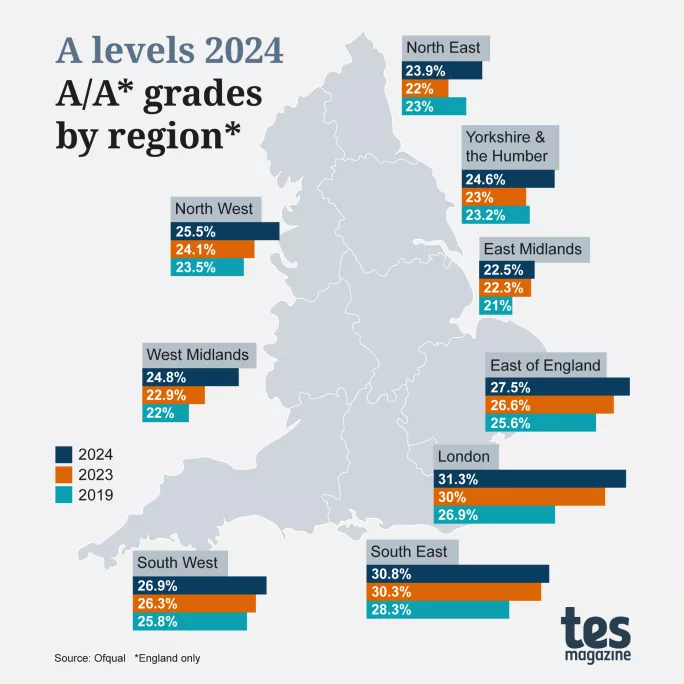Ofqual chief raises concern over region’s A-level performance

The chief of Ofqual has said it is a “cause for concern” that one region of England has seen a below-trend increase in A-level performance.
Speaking to Tes on results day, chief regulator Sir Ian Bauckham said: “The exam system doesn’t create disparities, it reveals disparities. And if we don’t reveal where these disparities or injustices are, we won’t be able to focus our resources and address them.”
All regions in England saw their proportion of top A-level grades achieved increase compared with last year in the results published today - including the North East, which saw the lowest proportion of top grades last year.
Sir Ian highlighted how both the North East and the West Midlands saw top grades increase above the national trend this year.
A levels: East Midlands ‘a cause for concern’
However, the East Midlands only saw a 0.2 percentage-point increase in the proportion of top grades achieved - below the trend compared with other regions.
It was the lowest performing region in England in terms of entries at A level awarded an A or A*.

And these figures mean that the gap between the lowest-performing regions of England and the highest-performing remains stubbornly wide and larger than it was last year.
“That is a cause for concern,” said Sir Ian. “I know that all of my colleagues, including those in schools in the East Midlands, will be very concerned about that, and will want to do everything in their power to make sure that young people in those regions that are still performing less well have the same opportunities.”
Earlier this week Sir Ian described regional and disadvantage-related attainment gaps as a “scandal”.
- More on A-level results day:
- A-level results 2024: Top grades up in England
- Reaction: How resilience in the face of disruption defined this year’s A-level cohort
- Trends: 8 key trends in this year’s A-level results
- Subjects: How did each area perform?
Education secretary Bridget Phillipson has pledged to turn around “baked in” educational inequalities, and accused the former Conservative government of leaving behind a legacy of regional disparities.
Tes reported in June that the Institute of Physics and many teachers had written to exam board AQA to complain that one of the physics A-level papers this year was “unreasonably difficult”.
Sir Ian said Ofqual had asked AQA to look closely at the difficulty of the paper and evaluate it.
“We’ve taken a close look at grade outcomes in that subject, and we are confident that grade outcomes fairly represent the achievement of students and are adjusted for any increases in difficulty in some parts of the assessment that may have been apparent,” Sir Ian said.
He added that other parts of the physics A level were not judged to be more difficult than previous years.
An AQA spokesperson said results for the exam board’s A-level physics qualification this year are very similar to last year, and grading and awarding have shown that students were not disadvantaged by the paper that was complained about.
AQA said the quality of its exam papers is of the “utmost importance”, and it has appointed a new team of scrutineers to improve the exam review process.
The exam board is also looking at all question papers that could be selected for summer 2025 “to make sure the questions are clear and accessible”.
Like many subjects, physics saw an increase in the proportion of top grades awarded this year compared with last year and with 2019, before the pandemic.
Top grades increase
Ofqual has said that examiners were asked to maintain standards from 2023 when grading this year.
The proportion of A*s and As awarded this year overall was above the figure for 2023, with 14,000 more top grades achieved in England this year compared with last.
This year’s A-level cohort were in Year 9 when the Covid pandemic began, meaning that their secondary education was disrupted by lockdowns.
They were the first cohort since the pandemic to have externally assessed GCSEs, in 2022 - though with mitigations in place.
Sir Ian told Tes: “They had all been tested on a national basis in the same way - that probably led to slightly different choices, both in terms of which A levels they should do and whether they should even do A levels.”
Schools and colleges were able to put in place “rigorous gateways” to make sure that the right students entered A-level study, he added, and “that definitely led to a slightly different make-up in this year’s A-level cohort”.
Sir Ian congratulated all the students who received results today, and said stakeholders have reported “very few” helpline queries.
He added: “Everybody’s very anxious that we reconfirm that we intend to do the same next year as we’ve done this year and last year, in order to enable them to plan for the future.”
For the latest education news and analysis delivered directly to your inbox every weekday morning, sign up to the Tes Daily newsletter
Register with Tes and you can read two free articles every month plus you'll have access to our range of award-winning newsletters.
topics in this article



